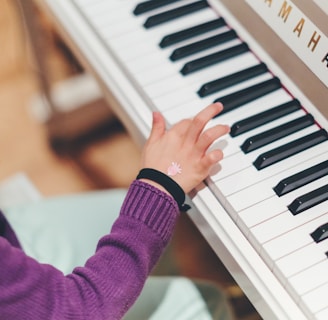
How Music Education Improves School Performance
Music education has long been recognized not only as a way to nurture creativity and self-expression but also as a powerful contributor to academic achievement. In today’s highly competitive and results-driven educational landscape, parents and educators are increasingly seeking ways to support student success beyond conventional classroom instruction. One often underappreciated yet impactful avenue is music education. Numerous studies, expert testimonials, and real-world examples demonstrate how music lessons can profoundly improve a child’s overall school performance. In this blog, we delve into the science, psychology, and practical aspects of how music education boosts academic outcomes, fosters essential cognitive skills, and supports social-emotional development.
Sugander Santhapuri
5/31/20256 min read


1. The Cognitive Connection Between Music and Learning
One of the most well-documented benefits of music education is its impact on brain development. Neuroscientific research has shown that music engages multiple areas of the brain simultaneously, including those responsible for language, reasoning, memory, and spatial-temporal skills.
Language and Literacy: Children who receive music instruction often display enhanced language development. This is because music and language processing share neural circuits. Learning to differentiate pitch, rhythm, and tone in music sharpens auditory discrimination skills, which are essential for reading and phonological awareness.
Mathematical Ability: Music education enhances spatial-temporal reasoning—the ability to visualize patterns in space and time—which is a key skill in mathematics. Understanding rhythmic patterns, note durations, and musical structures contributes to mathematical thinking.
Memory and Attention: Playing an instrument or learning a new song requires concentration and the memorization of sequences. This strengthens both working and long-term memory, as well as attention control, which are vital for academic learning.
2. Improved Academic Performance Across Subjects
Numerous studies have linked music education with higher academic performance across various subjects:
Reading and Writing: A study conducted by the Arts Education Partnership found that students involved in music programs scored higher on reading comprehension and vocabulary tests.
Mathematics: Research published in the journal "Psychology of Music" demonstrated that students who participated in structured music lessons scored significantly better in math assessments than their non-musical peers.
Standardized Test Scores: According to the College Board, students with coursework in music performance and music appreciation scored higher on the SAT compared to those with no music coursework. The benefits were particularly noticeable in the verbal and math sections.
These findings suggest that music education is not an extracurricular luxury but a core contributor to academic excellence.
3. Enhancing Executive Function Skills
Executive functions are a set of mental processes that include working memory, cognitive flexibility, and inhibitory control. These skills are critical for planning, decision-making, and behavior regulation in academic settings.
Planning and Organization: Learning music involves setting goals (like mastering a piece), planning practice sessions, and organizing time effectively.
Inhibitory Control: Playing music in an ensemble or solo performance requires impulse control, listening, and waiting for the right moment to act.
Cognitive Flexibility: Musicians must adapt to new keys, tempos, and styles, which enhances their ability to switch tasks and think creatively in academic situations.
Children who engage in regular music education often display superior executive function skills, leading to better performance in tasks that require critical thinking and problem-solving.
4. Music as a Motivational and Emotional Tool
Motivation and emotional well-being play pivotal roles in a child’s school performance. Music education nurtures both intrinsic motivation and emotional intelligence.
Self-Expression and Confidence: Performing music helps students express their emotions and ideas, building self-esteem and a sense of achievement.
Resilience and Perseverance: Learning an instrument or mastering a complex musical piece teaches patience, discipline, and the value of sustained effort—qualities that are transferable to academic tasks.
Stress Reduction: Playing or listening to music has been proven to reduce cortisol levels and promote relaxation. A stress-free mind is more open to learning and retaining new information.
5. Music and Social-Emotional Learning (SEL)
Music education supports social-emotional learning by encouraging collaboration, empathy, and effective communication.
Teamwork and Cooperation: Group music classes such as choirs, bands, and ensembles foster cooperation and mutual support. Students learn to listen to others and work together toward a common goal.
Emotional Regulation: Through musical activities, children learn to identify and express emotions constructively, aiding in emotional regulation and interpersonal relationships.
Cultural Awareness: Exploring music from various cultures enhances global understanding and empathy, qualities that enrich classroom interactions and group projects.
These social-emotional skills contribute to a positive school experience and improve peer relationships, both of which support academic success.
6. Classroom Behavior and Discipline
Behavioral improvements linked to music education also influence academic performance:
Improved Focus: Regular musical practice conditions children to concentrate for extended periods, improving classroom attentiveness.
Reduced Behavioral Issues: Structured music programs offer a productive outlet for energy and creativity, reducing behavioral problems.
Increased Attendance: Schools with strong music programs often report higher attendance rates. Students feel more connected to school and are motivated to participate.
Teachers frequently note that students involved in music are more engaged, respectful, and enthusiastic in class.
7. Music Education for Students with Special Needs
Music education is especially beneficial for students with learning differences, such as ADHD, autism, and dyslexia.
Autism Spectrum Disorders: Music helps improve communication, social interaction, and motor coordination. Structured musical activities provide predictability and sensory engagement.
Dyslexia: Rhythm training and auditory discrimination exercises improve phonological processing, a core challenge in dyslexia.
ADHD: Musical training enhances impulse control, attention span, and executive functioning, aiding classroom performance.
Tailored music programs can unlock the potential of students who may struggle in traditional academic settings.
8. Long-Term Academic and Career Advantages
The benefits of music education extend beyond primary and secondary school:
College Admissions: Participation in music is viewed positively by college admissions officers, as it demonstrates commitment, discipline, and creativity.
Career Skills: Music education cultivates skills such as collaboration, communication, critical thinking, and adaptability—all highly valued in the workforce.
Lifelong Learning: Musicians often develop a lifelong love of learning and self-improvement, which contributes to ongoing personal and professional development.
9. Real-World Examples and Success Stories
Finland: The Finnish education system, consistently ranked among the best in the world, integrates music education from early childhood. Teachers and policymakers cite music's role in enhancing student engagement and cognitive development.
El Sistema (Venezuela): This revolutionary music program for underprivileged youth has demonstrated significant improvements in school attendance, academic achievement, and social behavior.
American Schools: Numerous school districts in the U.S. report higher test scores and graduation rates among students who participate in music programs.
10. Integrating Music Education in Schools and Homes
Parents and educators can support music education in multiple ways:
Advocating for School Programs: Support and fund school music programs. Encourage administrators to prioritize music as part of a well-rounded curriculum.
Providing Access at Home: Enroll children in music classes, provide instruments, and create a home environment where music is valued.
Blending Music with Academics: Use songs to teach math facts, grammar rules, or historical events. Encourage musical projects that align with academic subjects.
11. Overcoming Barriers to Music Education
Despite its benefits, music education often faces challenges:
Budget Cuts: Music programs are frequently among the first to be reduced or eliminated during budget constraints. Advocacy is essential.
Access and Equity: Not all families can afford private lessons or instruments. Community initiatives, scholarships, and school programs can help bridge the gap.
Misconceptions: Music is sometimes seen as non-essential. Raising awareness about its academic benefits can shift public perception.
By recognizing and addressing these barriers, we can make music education more accessible to all students.
12. Expert Testimonials
Dr. Nina Kraus (Northwestern University): Her research demonstrates how music training shapes the brain and improves auditory processing, literacy, and learning.
Sir Ken Robinson (Educational Reformer): Advocated for creativity in education, emphasizing that arts, including music, are as important as math or science.
Dr. Anita Collins (Music Educator and Neuroscientist): Highlights how learning music fires up multiple parts of the brain, supporting learning readiness and academic achievement.
13. Conclusion: Investing in Music is Investing in Academic Success
Music education is not merely a creative outlet or extracurricular activity; it is a foundational element of a successful educational experience. From cognitive development and academic achievement to emotional intelligence and behavioral improvements, the benefits of music education are profound and far-reaching. By incorporating music into children's lives, both at school and at home, we lay the groundwork for better learners, stronger thinkers, and more empathetic individuals.
At Three Stars Music Academy, we believe in the transformative power of music. Our programs are designed to nurture not only musical talent but also the academic and personal growth of every child. Whether your child is just beginning their musical journey or looking to expand their skills, music education is a gift that keeps on giving.
Ready to Begin? Explore our programs and see how music can elevate your child’s academic journey. Visit our website to schedule a free trial class and unlock the harmony between music and education.




